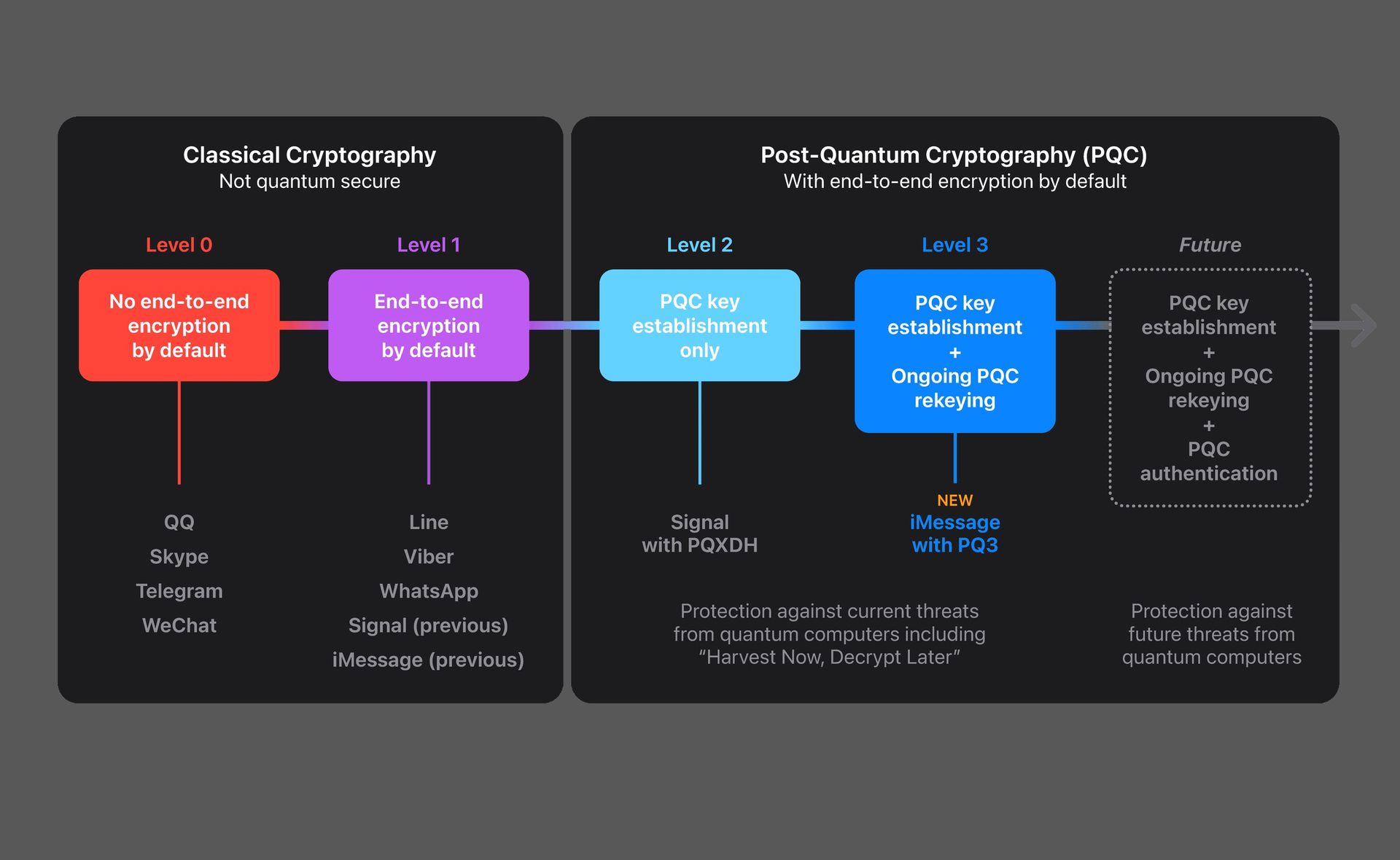The tech giant has revealed its new Apple PQ3 protocol for iMessage, a proactive response to the looming threat of quantum computing.
Traditional encryption methods, which protect vast amounts of online data, are vulnerable to the incredible power of future quantum computers. Apple PQ3 protocol dramatically redefines iMessage security with cutting-edge technologies designed to withstand these advanced attacks, ensuring your conversations remain private even as technology evolves.
What is Apple PQ3 protocol and how does it work?
The revolutionary Apple PQ3 protocol represents a quantum leap in secure messaging. It is a meticulously designed system that employs a combination of traditional and cutting-edge post-quantum encryption technologies to safeguard iMessage conversations from current and future threats.

Quantum-resistant encryption
“…A sufficiently powerful quantum computer could solve these classical mathematical problems in fundamentally different ways…”
This statement from Apple’s blog post on the Apple PQ3 protocol highlights the core vulnerability of traditional encryption. Classical algorithms like RSA and Elliptic Curve Cryptography, while secure against current computers, could succumb to the extraordinary power of quantum computers. PQ3 addresses this proactively.
Mitigating “Harvest Now, Decrypt Later” attacks
“…Attackers can collect large amounts of today’s encrypted data and file it all away… decrypt it in the future…”
Apple’s PQ3 directly counters the “Harvest Now, Decrypt Later” strategy. By ensuring encryption keys are regularly updated and self-healing, the protocol limits the value of any data an attacker might harvest, even if they one day obtain a powerful quantum computer.
Beyond the basics
“…PQ3 is the first messaging protocol to reach what we call Level 3 security — providing protocol protections that surpass those in all other widely deployed messaging apps…”
Apple isn’t merely adopting post-quantum cryptography; they are raising the bar for secure messaging. PQ3’s Level 3 protection distinguishes it by actively and continuously defending against both current and future attacks.

A closer look at PQ3’s design
“…We rebuilt the iMessage cryptographic protocol from the ground up to introduce post-quantum cryptography …and mitigate the impact of key compromises…”
PQ3 isn’t a simple patch. Apple completely redesigned their cryptographic protocol to seamlessly weave in these advanced protections. Key compromises are a reality, so PQ3’s ability to self-heal and limit the fallout is crucial.
“…We then include … a periodic post-quantum rekeying mechanism that self-heals from key compromise and protects future messages…”
This periodic rekeying is at the heart of PQ3’s power. By introducing fresh encryption keys on a regular basis, the protocol maintains its security even if an adversary compromises one key.
How does Apple PQ3 protocol affect iMessage?
The fundamental impact of PQ3 is future-proofing iMessage against the threat of quantum computers. Even if powerful quantum machines become capable of cracking traditional encryption, PQ3 will safeguard your conversations.
According to their statements, Apple has carefully designed PQ3 to minimize any impact on the user experience. While increased security often comes with a performance trade-off, Apple aims to make the transition to PQ3 as smooth as possible for users.
Apple’s implementation of PQ3 puts them at the forefront of secure communication innovation. But one simple question remains: Can iMessage tackle WhatsApp now?

iMessage vs WhatsApp: Which one is more secure?
Two of the most popular messaging platforms in the world prioritize the security and privacy of their massive user bases. As technology continues to evolve, the methods used to safeguard our online communication must adapt to meet new and sophisticated threats. Understanding the different security approaches used by these messaging giants can empower users to make informed choices about how they protect their digital lives.
Apple PQ3 protocol introduces a significant change in how the company approaches message encryption. Its rekeying mechanisms and hybrid design aim to provide superior protection against both current and future threats. WhatsApp, also known for its strong security, relies on different methods and has yet to publicly announce a similar shift toward post-quantum cryptography.
WhatsApp prioritizes user transparency and control through its Auditable Key Directory. This feature allows users to manage their encryption keys with more granularity. Apple offers a comparable feature with Contact Key Verification, although it currently has a narrower scope.
Apple’s bold move to incorporate the Apple PQ3 protocol highlights their commitment to proactive security measures, anticipating the potential of quantum computing to disrupt established encryption. WhatsApp could follow suit in the future, potentially leveraging its centralized infrastructure to streamline the adoption of similar security enhancements.
Lastly, users should note that platform choice matters. WhatsApp functions across both iOS and Android, while iMessage remains exclusive to Apple devices. This compatibility factor, alongside security considerations, will help users determine the messaging platform that best aligns with their needs.
Featured image credit: Volodymyr Hryshchenko/Unsplash.





